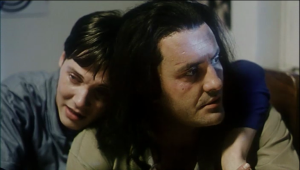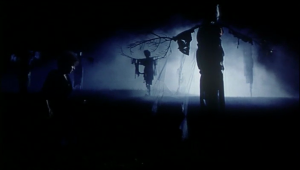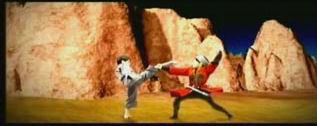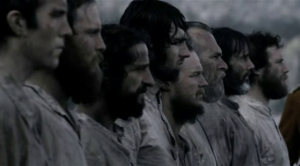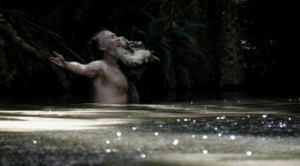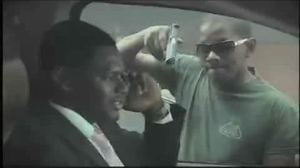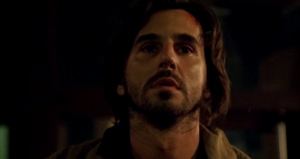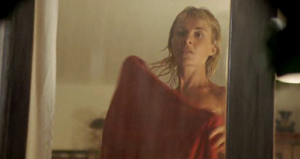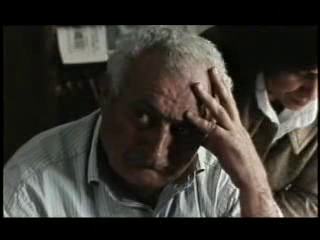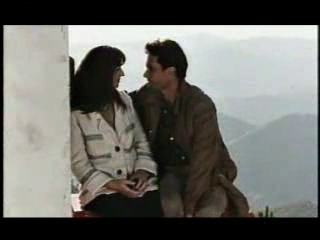In The Lap Of The Gods
This week, Coke bottles, clumsy scientists, crazy rebels and credulous natives in the most famous African film of all time discussed in a review masquerading as an analysis pretending to be a review. Er…yes.
The Gods Must Be Crazy
(1980) Written & Directed by Jamie Uys
(You’ll find a trailer at the end of the previous post)
“One day, something fell from the sky. Xi had never seen anything like this in his life. It looked like water, but it was harder than anything else in the world. He wondered why the gods had sent this thing down to the earth.”

When worlds collide: the clash of civilisations with 'hilarious' consequences in 'The Gods Must Be Crazy'.
When a carelessly-tossed Coke bottle is discovered by an isolated tribe of San (Kalahari Bushmen) one day, it quickly disrupts their peacefully-balanced community, introducing the concepts of possession and greed. With their community falling apart, elder member Xi decides to return the evil object to the gods from whence it came. However, the gods are not particularly concerned, having problems of their own.
In 1980, two South African film companies released what would become the continent’s most successful film ever. 31 years later, the record has still not been broken, despite the rise of the Nigerian film industry, whose output is second only to Hollywood. The lighthearted tale of the stereotypical African tribesman, free of the trappings of ‘civilisation’ and his subsequent encounter with it in the form of white scientists and schoolteachers, along with warring political factions and colourfully-dressed agrarian villagers ever-ready for song, ticked all the boxes for the global audience. Here was the gentle image of Africa, without the darker realities of racial slaughter, rampant poverty, or the fact that the land mass actually comprised many countries and cultures, casually reinforced through smiling natives, slapstick and Johannesburg’s answer to Hugh Grant.

Sandra Prinsloo stars as Kate, love interest and bringer of enlightenment to the natives of Botswana.
For the general theatergoer, either uninterested by the film’s quiet cementing of their preconceptions or simply unconcerned by it, The Gods Must Be Crazy was a wonderfully exotic comedy adventure, filled with warmth and old-school humour reminiscent of Hollywood’s silent clowns – thanks in large part to the many sped-up film sequences. The more critical viewer, however, saw the lament of the White Man’s Burden all throughout: the poor, yet content Batswana villagers in need of a white woman to educate them, Aryans depicted as gods by primitive tribes people, while those of African descent who did attempt to recreate Western civilization reproduced only instability and civil war. Worst of all was the depiction of the San, or Kalahari Bushmen of Botswana, who, since this was after all ‘Darkest Africa’, lived in total ignorance of the age of industrialisation. Not that this was a problem for them, we are informed by the casually authoritarian narrator during the opening scenes, since the Bushmen lived in their own, perfectly-balanced Eden-like desert paradise. The carelessly-tossed Coke bottle symbolised the disease of Western consumerism, forcing the happy natives to learn the concept of possession, greed and jealousy: having not been inoculated against such viruses, they spiral rapidly downward into misery until one brave and incorruptible Bushman takes it upon himself to venture into the world of the gods and put everything back the way it was.
Ultimately, both points of view are correct, with extremists on both sides missing the point. The Gods Must Be Crazy is, I feel, an intentionally light-hearted comedy, informed by neither the self-righteous nor the ignorant points of view imposed upon it by the rest of the world. It was produced by two South African film companies (CAT Productions and Mimosa) and informed by a very South African perspective of their nearby neighbours. That the film-makers may have had a very patriarchal view of the African native races is an easy conclusion to reach as it is to cry ‘apartheid’ by those who never lived through it. It is inevitable that the chief protagonists will be white, since the film is made by white people for white people. Is Hollywood, Bollywood, Media Asia or indeed Nollywood any different? Note also during the Johannesburg sequences early on the way in which Kate (played by Sandra Prinsloo) and her fellow office workers of both races are seen to work on equal terms. Interesting side note: Sandra Prinsloo would seriously test proponents of apartheid when in 1985 she played a white woman seducing a black man in the play Miss Julie, causing much of the audience to walk out. For these people, The Gods Must Be Crazy would certainly reaffirm their viewpoints, yet if the film’s producers shared these views, it is unlikely the sequence I mention earlier would be present – nor the overall warmth of the piece. Such prejudice does not produce feel-good films.
“Here was the gentle image of Africa, without the darker realities of racial slaughter, rampant poverty, or the fact that the land mass actually comprised many countries and cultures, casually reinforced through smiling natives, slapstick and Johannesburg’s answer to Hugh Grant.”

Attempts at 'civilisation' by the locals are seen as chaotic and unstable...with 'hilarious' consequences.
Another point I think is overlooked is the obvious one: The Gods Must Be Crazy is a film, not a documentary. That its opening narration does not help this fact is something I will return to later. Either way, the film follows the same formula that one would find in Hollywood to achieve the same ends: romance, adventure, and silliness. Everyone present is a caricature: Marius Weyers predates Jeff Goldblum’s bumbling, yet capable scientist by a decade while Michael Thys as M’Budi is the archetypal sidekick – dismissed, put-upon, but ultimately wise, funny, and existing entirely to elevate the hero. Prinsloo’s Kate is the heroine-by-numbers – young, blonde, attractive, sexy, motherly, and above all, straight. The credits are not allowed to roll until the two end up in each other’s arms – the previously irritating stupidity of the lead male having been reinterpreted as cute by the female. The villain is no less two-dimensional. Sam Boga (Louw Verwey) may be a political revolutionary, but his chosen lifestyle and belief systems are never intended to be explored. His villainy cannot extend beyond gruffness and peaceably kidnapping children who are never in danger of physical violence beyond that of a mandatory hiking trip. He exists to be vanquished five minutes before the leads profess their undying love. At no point is any of this meant to be an educational discourse on political instability in Botswana. If the action had taken place in Idaho, it is unlikely the matter would even have been brought into question.
Then of course there is the true star of the film, the symbol of everything good and indeed everything wrong with it: the Bushman himself. N!xau the performer is the genuine article – an actual descendant of the San tribe, or ‘Bushmen’ as they were called previously, which is now considered derogatory. Interested parties may wish to check out the special follow-up feature on the DVD release, where one of its biggest fans journeys to Namibia, where N!xau resided, and discovers how the San really live. Far from the isolated paradise depicted in the film, the San eke out a poor life of subsistence, while the introduction of technology to the area has been readily-embraced, particularly by the young, rather than feared. N!xau was however, every bit the hunter that Xi was, no less unconcerned by wealth, and no less likeable. His personality secured him the role, though he knew better than anyone that he was being called upon to re-enact a world that may never have existed. The fantasy holds together on the strength of his performance, more being than acting. It is a performance, however, and no-one involved is unaware of the fact. That the San would be depicted in a Southern African film is hardly exotic: they are the indigenous natives of the region.

Slapstick and overcranked film sequences provide much of the production's humour and helping to distract from any political statements that may unwittingly hove into view.
When all these elements are pulled together, The Gods Must Be Crazy cannot help but be a feel-good comedy. The formula guarantees its success. Admittedly, the slapstick humour only works on children, and I would like to think we have all become a little more sophisticated in the decades since.
The trouble with all this is that films do strongly imprint our perceptions of the world – along of course with television, Twitter, and advertising. Information, whether correct or incorrect, weaves its way into our subconscious and takes root when packaged in an attractive, believable form. Crocodile Dundee, in many ways the Australian counterpart to The Gods Must Be Crazy, still quickly comes to mind when generations of Americans think of the world Down Under. The easy-going, knife-wielding larrikin inhabited by Paul Hogan is no less a caricature than N!xau, the film no less a fantasy image of Australia. Far fewer critics accuse Crocodile Dundee of attempting to undermine the Australian character, clearly recognising it for what it is. There was no public outcry bemoaning the Hugh Grant oeuvre for reinforcing the American perception of the British as bumbling, uptight and inept, nor against The Serpent And The Rainbow for suggesting that all Haitians practice voodoo. Yet the imprinting is no less powerful, particularly among the youth, where the Third World image of Africa makes The Gods Must Be Crazy all too believable.
In this world, only the white man can be the scientist, only the white woman the educator, the latter of whom is shown to literally leave the ‘civilised’ world in order to step into this role, where the natives are the untamed Other. Yet despite this role, only the actions and desires of these two people are shown to be of any real import. The natives are simply part of the backdrop against which this entirely Western romance-comedy takes place, existing only to provide the means for their coming together.
“Information, whether correct or incorrect, weaves its way into our subconscious and takes root when packaged in an attractive, believable form.”
The native Africans essentially fall into two camps, both of which are deemed to be lower than their white masters. The villagers are poor, yet happy: educating them is seen as a duty of those more fortunate, but we don’t have to feel sorry for that they toil the fields as they don’t yearn to better themselves or desire equality. Indeed, the film goes to great pains – particularly through the initial narrative – to point out that Western civilisation is not especially desirable, that it bears the price of advanced development. And yet only the products of this civilisation are able to solve the problems faced in the ensuing drama, which leads to the second category: ineptitude.
The Sam Boga subplot involves the revolutionary-on-the-run sending his followers to assassinate the local heads of government for reasons not widely explored. The plan fails, with his soldiers shooting the wrong targets and hiding in a banana plantation after having stirred up the hornets’ nest. A good deal of this ineptitude is heightened by the sped-up film sequences and the fact that machine guns rain bullets yet rarely strike their target. In the end, both the revolutionaries and the public officials are unable to stop the other without the assistance of the real masters of the land, the message clearly telegraphed that they are only playing at civilisation.
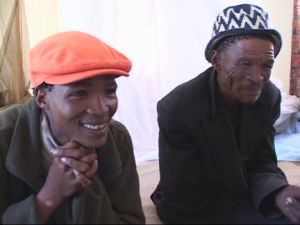
Unwitting star N!xau, shortly before his death, watching 'The Gods Must Be Crazy' for the first time in 'Return To Nyae Nyae', a special 'Where Are They Now?'-type feature on the DVD release.
The San, meanwhile, occupy the role of the ‘noble savage’, and here, the narration steps into play to reinforce this image. Like the disclaimer at the beginning of a Dan Brown novel, it misleadingly attempts to establish its credentials as gospel. There is every indication from this masquerade that we are watching a documentary as the melifluous tones of Paddy O’Byrne permeate the moving image and control our perceptions of the harsh wilderness on screen. Our host suggests, in his comforting authoritarian voice that clad in animal skins, able to produce food from a seemingly barren desert and of course, innocently happy, the San are our living ancestors who have somehow retained a primitive wisdom we, the builders of the future, have lost. It serves the dual purpose of satisfying that yearning animal desire for natural simplicity, while at the same time assuaging any guilt we may feel over the fact that here is a people living in complete poverty – the ever-smiling and good-natured Xi cannot help but give us a warm feeling of satisfaction that we needn’t do a thing about his complete lack of modernity. Were the film to journey to the real Botswana or Namibia, as our DVD documentarian did years later, the overwhelming guilt would only spoil the good mood.
This, in a way, brings us back where we started by reminding us that The Gods Must Be Crazy is little more than exaggerated fiction. It is too ridiculous to be taken seriously on a conscious level, yet too pervasive in its reinforcing of stereotypes not to be convincing on a subconscious level. I struggle to believe that it is anything more than a feel-good farce, intended as a comedy best-suited to lovers of slapstick and disposable cinema, but its implications are subtle to those not paying attention, ie – most film-goers. If it is guilty of racial profiling, however, then so is every film studio in Hollywood and beyond. Of course, we are pre-conditioned not to tar them with the same brush.
*****
Next Time
A window into the lives of Rio de Janeiro’s shanty towns, the gangs that rule them and the spectre of hopelessness hanging over the lives of the people who live there in the Brazilian drama City Of Men. Click below to view a trailer:
I’d Rather Be A Man
This week, civil war, persecution and dark humour as World On Film travels to Bosnia-Herzegovina for the memorable snapshot into madness:
Go West
(2005) Written & Directed by Ahmed Imamovic Co-written by Enver Puska
“We’re slaughtering each other like in the Middle Ages while abroad, they’re making computer chips. You know how much data a computer chip the size of a fingernail can contain? A million! And where are we? Persecuting each other on hills and in forests like we didn’t have anything more intelligent to do.”
It’s 1992, and the Yugoslavian Socialist Republic is collapsing into a series of brutal civil wars. As Serbian forces lay siege to Sarajevo, Serbian student Milan and his cellist Muslim boyfriend Kenan have no choice but to flee the ethnic cleansing. With Muslim citizens being executed all over Bosnia, Milan disguises Kenan as his bride-to-be, allowing them to escape to the relative safety of the countryside where Milan’s father Ljubo lives until they can obtain the necessary papers promising passage to the Netherlands. However, maintaining the deception becomes harder and harder: Milan’s best friend Lunjo quickly learns the truth and Ljubo is especially keen to marry the happy couple. Worse still, Milan is suddenly drafted into the army, leaving Kenan alone to keep up the pretence, made all the more difficult by the sex-starved Ranka, a local waitress who the whole village seems to fear.
My initial impressions of Go West were that it would primarily be a fairly damning commentary on the Yugoslav war – a harsh, but sobering drama that would leave the viewer in no doubt as to the futility of ethnic and religious hatred, and indeed war itself. Which indeed it is, but it is also a condemnation of homophobia, while at the same time, the sheer absurdity of the fleeing couple’s predicament elevates Go West’s discourse into black comedy and farce – something that writers Ahmed Imamovic and Enver Puska expertly mesh with the general message of social meltdown and the way it destroyed Bosnia and Herzegovina – without one theme compromising the other.

A disguise of convenience becomes a new identity, as refugees Milan and Kenan are forced to 'marry' in order to keep up the pretence.
Horror and madness must come before absurdity of course, and there is definitely nothing to laugh at during the opening sequences, where the two protagonists carry on with their lives in Sarajevo before they are overwhelmed by the turmoil. Director Imamovic weaves genuine newsreel footage of the conflict into his specially-shot sequences of Serbian militia terrorising the locals and gunning down the Muslim population (with soldiers forcing men’s pants down in search of tell-tale circumcisions). As Milan and Kenan’s lives are quickly overturned, forcing them into flight, the audience is given a street-level snapshot of how the conflict might have been experienced firsthand.
Fuelled by such life-or-death desperation, I found myself wondering if indeed the real-life Muslim homosexuals might too have disguised themselves as married women in order to escape execution. As Kenan himself states at the beginning, “On the Balkans, it’s easier to bear if someone in the family is a murderer rather than a faggot [sic].” Under pressure from all sides, much of the tension in Go West therefore derives from we the audience wondering just how long he will be able to maintain his disguise while besieged by threats on all sides (some not necessarily malicious) to expose the truth. Actor Mario Drmac plays the would-be transvestite with great skill, giving Kenan a quiet strength, though portraying him on a knife-edge as the drama escalates. Go West is ultimately his story, showing the lengths the natives must go through in order to survive the war: humiliation, desperation, and above all, loss, leaving only courage or madness to dictate how one lives their remaining life.
“[Go West is a] black comedy and farce – something that writers Ahmed Imamovic and Enver Puska expertly mesh with the general message of social meltdown and the way it destroyed Bosnia and Herzegovina.”
The writers are also keen to point out the ridiculousness of the predicament, not only through Kenan’s constant struggle to ensure his ‘breasts’ appear convincing or the stubble from his face, but in the whole cast of villagers whose world ranges from witchcraft and superstition to the local priest more concerned with political rhetoric than the salvation of the soul. Some of the characters are obvious comic relief, while in other cases, the humour creeps up on you with the forced jollity of the inhabitants that causes events to spiral further out of control. Ljubo is perhaps the strongest example of this. Wonderfully played by veteran actor Rade Serbedzija, the one-time Texan rancher fights daily against resignation and melancholy in the face of so much loss, unable to see that his good intentions are making things harder. His son Milan, played by Tarik Filipovic, sits somewhere between the two people he cares about most: warm and all-embracing, yet feeling as though only he truly understands the sacrifices that must be made. In contrast, Ranka, in a strong performance by Mirjana Karanovic, has far baser desires, which threaten to unravel the entire social fabric. Tragically, only the viewer is ultimately able to see the lighter side of their predicament.
While I think the blend of drama and black humour hold together well, there are some aspects of the script that don’t entirely work as well as they could. The witchcraft element, for example, seems to be there simply to build up the potential threat of certain characters, yet ultimately doesn’t seem to have any other meaning beyond this. Elsewhere, the murder of certain antagonists seems out-of-character for those enacting them, and done simply to pull the writers out of a hole during the all-important climax. This may sound a little odd in a film where senseless killing would be considered inevitable, but perhaps readers will know what I mean when they watch for themselves.
Ultimately however, these elements do not cause serious damage to the film’s central premise, nor fear and madness of one of the 20th Century’s most brutal civil wars. It does not try to be universal commentary on the fall of the republic, but instead ‘zoom in’ to a snapshot of the personal tragedy and persecution of those perceived to be socially abhorrent, which of course, they were not – merely ordinary people trying to survive. It reminds me of similarly-themed Albanian film, Slogans, also a drama/black comedy exploring the absurdity borne of a society descending into madness and painting itself into a corner. In Go West however, there is a much higher body count.
This, and the many twists and turns of the plot, may cause the viewer to wonder if anyone will ultimately get out alive. In the end, Go West delivers a bittersweet conclusion and a very poignant message. Hope survives, though many will have to die first – a not incongruous ending for film with war as its subject. Definitely recommended.
*****
British Virgin Islands

The wreck of the RMS Rhone, the popular diving site that once doubled as the Goliath in the 1977 blockbuster, 'The Deep'.
This Caribbean British outpost has yet to dazzle the world with its film-making prowess, hampered at present by the complete non-existence of a film industry and hampered still further by being far too small for such things – not even a travel documentary explaining why the late 1960s is the ideal time to visit. It has occasionally however been used as a location, and located as it is in the heart of ‘stereotypical pirate’ territory, its exotic appearance speaks of old-world adventure, though today, it is just as associated with drug trafficking and Richard Branson.
In more recent times, it was an island rich in cannibals destined to ingest a group of New York tourists in the uncelebrated 2008 horror film Holocaust Holocaust, the destination for a Geek Cruise in 2007, and in 2003, just one of the many remote hideouts chosen by Dream Chasers, people who had given up the rat race in search of a new life away from the concrete jungle. A decade ago, it was on three occasions a popular filming location for the Boob Cruise series, the focus of which would suggest the islands are today ‘virgin’ in name only.
Most fans of celluloid however will have seen something of the BVI via the 1977 blockbuster horror/thriller, The Deep, in which the sunken packet ship RMS Rhone doubles for the morphine-rich home of tiger sharks, the Goliath. Today, the Rhone, sunk two centuries earlier by a hurricane, is a popular diving site, though as far as I know, has yet to yield any treasure. I prefer Jaws myself.
*****
Next Time
Western civilization quite literally strikes the natives of the Kalahari in Botswana, causing chaos, misery and misunderstanding. The continent of Africa’s most famous film to date goes under the spotlight when World On Film examines the slapstick comedy, The Gods Must Be Crazy. To view a trailer, click below:
No Mercy
World On Film goes all-Azerbaijan, all the time this week with a double feature. First up is the uncomplicated but lighthearted enjoyable fluff of Bu da belə, followed by the full-length ‘straight-to-video’ terribleness that is Şeytanın Tələsi. Just what do these two untranslated titles mean? Read on…
Bu da belə
(2009) (Director unknown)
Bu da belə, or ‘That’s It’, as it translates into English, is a lightly amusing short film, running just over 3 minutes, about a man struggling to bring his girlfriend a new television for her birthday up the stairs of her rather dilapidated urban apartment in the absence of a functioning elevator. With the many obstacles he encounters on the way up, I couldn’t help but be reminded of Donkey Kong. The film’s title is taken from the last line of dialogue, which neatly sums up his ordeal. I once had to spend a day helping relatives move furniture in and out of their 3rd-floor apartment that was equally devoid of elevators, so I know exactly how he feels. The short runs at just about the right length given the premise and star performer Qurban Ismayilov has a good, expressive face for what is essentially a visual comedy. Nəsibə Eldarova plays the girlfriend. The film was made in 2009 and is actually quite easy to find online if you look in the obvious places. You’d be ill-advised to bother doing so with the next feature, however.
“I couldn’t help but be reminded of Donkey Kong.”
Şeytanın Tələsi
(2006) Directed by Tanriverdi Allahverdiyev
“I warned you many times not to play with the balls of other people.”
I am not a major fan of martial arts films, so when I do watch one, I expect it to have charismatic actors, decent production values and of course spectacular fight scenes. Şeytanın Tələsi, however, contained acting more wooden than a pine chest, the production values of a finger painting and fight scenes seemingly choreographed by a coma patient. I quickly found myself in more pain than anyone having their face rearranged on screen, and constantly fighting the urge to walk away and stare at the wall in search of something more entertaining. Given the many entries in the Azerbaijani film repertoire, I feel sure I simply picked the Middle Eastern equivalent of a Steven Seagal and that there are far better offerings from the Caspian nation waiting for me. In case you’re wondering why I therefore picked this one, it was the only Azeri-language film I could get hold of with English subtitles (The 40th Door has been screened at film festivals, but a copy wasn’t available). Of course I say ‘English’…
Whoever translated Şeytanın Tələsi clearly felt that anything more than a basic understanding of the dialogue would be a great extravagance. For all I know, the film could have had a script written by the Azerbaijani equivalent of Francis Bacon and the washboard-flat performances therein are the result of exquisitely subtle delivery. Not that I believe this for a second, but at the very least, I cannot condemn the writers for the bad dialogue that continually stabbed at my eyes whenever it appeared on screen. This did not always occur when it was supposed to – there were several occasions when lines of dialogue simply weren’t translated – most unbelievably of all during the inevitable climactic fight sequence. “What will be the end of this story?” one character asks with more stiltedness than a man with two artificial legs. ‘No idea,’ I replied from the other side of the glass, rapidly losing the will to live, ‘just so long as it comes soon.’
“I cannot condemn the writers for the bad dialogue that continually stabbed at my eyes whenever it appeared on screen.”
It may therefore come as no surprise that I didn’t fully pin down every nuance of the plot, although not being a cinematic adaptation of Wittgenstein, it wasn’t a total mystery either. Major Vagif Asadov (or Assadov – we are presumably offered two spellings as part of some sort of lexically-symbolic attempt at character depth) is a member of the nation’s equivalent of Special Branch, the FBI, or, given his passing resemblance to Zippy, the Rainbow House. Asadov oversees a sting operation intercepting a drug shipment supplied by Devil Barasa, an underground kingpin. Knowing Barasa will target his family in an act of revenge, Asadov sends his young son Yusif into the care of Azerbaijani karate master Tanrivaldi, who agrees to take his new young protégé into the forest to train him. Unfortunately, Team Barasa gets wind of this and set about the task of retrieving their ‘bargaining chip’. I could elaborate further, but I will avoid spoiling things on the off-chance that someone is mad enough to watch the film for themselves. Suffice to say, some rather dubious karate is involved. And just in case the audience isn’t convinced that Barasa and his henchmen are the villains of the piece, the actors helpfully elicit evil pantomime laughs when events are swinging their way.
One thing about Şeytanın Tələsi that seems abundantly clear to me is the lack of budget. This surely explains the hideous post-production work, to name one of the film’s many crimes. Like many a martial arts feature, sound effects are dubbed over the fight scenes to give them a more visceral feel. Unfortunately, the film’s audio geniuses don’t seem too keen to make them at least halfway-realistic. Swinging fists make swooping sounds like rotating helicopter blades, while connecting fists sound suspiciously like someone punching their own hand. Even more mystifying are the entirely misplaced sounds, such as the sudden swell of running streams and birdsong during a scene where two characters are traversing the busy streets of Baku.
“Swinging fists make swooping sounds like rotating helicopter blades, while connecting fists sound suspiciously like someone punching their own hand.”
Then there’s the musical portion of the soundtrack. Anyone who’s seen an episode of the original Star Trek will know that part of what makes its score so memorable is the repetition of its musical motifs. Typically, a number of cues would be recorded for the season and then repeatedly used throughout according to the action on screen. There were just enough pieces in the tank to cover all the major emotions. However for Şeytanın Tələsi, possibly in a clever attempt at Phillip Glass minimalism, the producers decide to follow the same approach with only two musical cues – one for ‘touching’ scenes, another covering ‘action’ sequences. For 90 minutes. There may have been a third, but since my neighbour was playing a cd at the time, I can’t be too certain. Assuming the viewer isn’t completely sick to death of this musical torture after the first half-hour, they may afterward feel an alarming urge to play something from the Commodore 64 collection. If your film budget can’t stretch to more than a couple of tunes, I’d consider silence as a viable alternative.
Not that silence doesn’t play a part in the story. The film is peppered with long sequences where characters seem to be engaged in discussion, but rather than make the audience privy to their dialogue, we are instead forced to lip-read a muted scene while ‘Music #1’ helpfully reminds us that we are watching two people speak. Halfway through, the dialogue cuts in, the content of which suggesting that whatever the speakers were discussing earlier, it can’t have been anything more than the football scores, as we soon hear their reason for meeting verbalized in full. Still it’s not the first time the director attempts to help the viewer understand what they’re watching, given that he felt the need to have someone state the film’s title while the title card was on screen. A kind perspective might perhaps suggest the muted dialogue scenes are in fact a filmic convention. An accurate one might suggest that Şeytanın Tələsi‘s overseers were struggling to fill up 86 minutes – something I strongly suspect given that the film concludes with a completely unrelated music video in which, via the magic of chroma key, the actor playing Yousef, for no discernible reason, stands against a very fake projected background practicing karate moves while simultaneously performing what I presume is a traditional Azerbaijani dance. How this relates to the drama that preceded it I would imagine can only be determined by transcending to a higher level of consciousness.
“A kind perspective might perhaps suggest the muted dialogue scenes are in fact a filmic convention. An accurate one might suggest that Şeytanın Tələsi‘s overseers were struggling to fill up 86 minutes.”
Mercifully, those 86 minutes do finally come to an end – the fact that they felt more like 586 minutes will scar me for life. Interestingly, when attempting to translate the film’s title, Şeytanın Tələsi would come to read ‘Telecine Of Evil’, or even ‘Satan’s Telecine’. No doubt the overwhelmingly-diligent subtitler would have been more than happy with that (would anyone care to enlighten me as to the actual translation?). If indeed demonic influence was involved, it was entirely successful, though for the wrong reasons.
Instead Of This
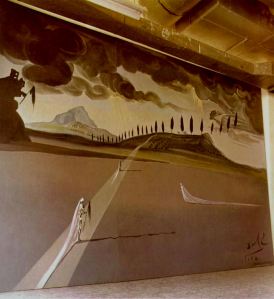 And with that, World On Film comes to the end of this first analytical foray into flickering foreign projections. I’ll be taking time off for about a month to recharge my batteries and catch up on other things strongly neglected. Several film reviews for countries beginning with ‘B’ have already been written, so the tracks are already being laid for the next ‘series’, as it were, which will begin in the warm, watery climes of the Bahamas. This does not however mean the onset of tumbleweeds bouncing with reckless abandon across the blog. I will continue to abuse this sector of cyberspace in the interim with my rambling waffle on matters dubiously connected with the World On Film raison d’etre.
And with that, World On Film comes to the end of this first analytical foray into flickering foreign projections. I’ll be taking time off for about a month to recharge my batteries and catch up on other things strongly neglected. Several film reviews for countries beginning with ‘B’ have already been written, so the tracks are already being laid for the next ‘series’, as it were, which will begin in the warm, watery climes of the Bahamas. This does not however mean the onset of tumbleweeds bouncing with reckless abandon across the blog. I will continue to abuse this sector of cyberspace in the interim with my rambling waffle on matters dubiously connected with the World On Film raison d’etre.
Coming next time therefore, I delve into the world of alternative film soundtracks, or more accurately, one in particular. If you can guess the relationship between a dark, spectral figure haunting a French music hall and a famous English prog rocker, you’ll be halfway there. Plans are also afoot to try and visit the 2010 Pusan International Film Festival next week and if they come to fruition, the blog will be here to provide an autopsy of the journey’s dead and rotting corpse. Don’t quite know where I’m going with this analogy, so I will simply sign off…until next time.
Fool Steps In Paradise
You may be familiar with the genealogy tv program, Who Do You Think You Are?, in which the show’s researchers help celebrities trace their lineage and taking them to ancestral home towns and/or other relevant sites of interest. I recently caught the Jason Donovan episode, and though Donovan has never to my knowledge acted in anything I would consider remotely watchable, his family history proved to be a good deal more interesting. The product of a British father and an Australian mother, he seems well-versed in his British heritage, but his estranged mother’s family was an almost blank canvas. Along the way, he would discover that his maternal great-grandmother was a star of the music hall in Melbourne, while an even more illustrious ancestor and wealthy landowner in Sydney’s Hawkesbury district during the early days of White Australian settlement was once tasked with constructing the first road through the Blue Mountains at the behest of then-governor Lachlan Macquarie. Even today, road building in these enormous jagged, natural rocky leviathans is no easy task. 200 years ago, it would have been sheer lunacy, but that’s precisely what William Cox, 30 convict labourers and 8 guards set out to do in 1814, with little more than shovels and unrealistic dreams. Yet there was method in the madness: the young settlement was suffering from a major drought and recent explorations to the other side of the range had revealed the arable land the colonists desperately needed to produce sufficient crops. 27 weeks later, the work was completed and Sydney’s future seemed assured.
“Though Donovan has never to my knowledge acted in anything I would consider remotely watchable, his family history proved to be a good deal more interesting.”
However, Australia’s convict history was far from rose-tinted and the means by which the fledgling colony would be made to survive of far greater ruthlessness than is typically taught in schools. The British government of the late 18th and early 19th Century, unable to entice enough willing settlers from the United Kingdom to Australian shores, resorted to enforcement. Suddenly, petty crimes that might have resulted in a small fine or even a simple caution were rewarded with a life sentence. The poverty-stricken were the obvious scapegoats, who quickly found that stealing loaves of bread suddenly meant geographic relocation and a decade of hard labour on the other side of the globe. The official line at the time was that this was simply a means of easing overcrowded prisons – a thinly-veiled deception that more than anything shows the lack of recourse victims had with the judicial system of the time: so desperate was the government to establish a colony there (other imperial powers of the time had also set their sights on the island continent) that they were perfectly content for the law to fall silent.
So it was that thousands of Britons were forcibly relocated to Australia and punished for having done so in labour camps. The more ‘serious’ criminals were shipped off to Tasmania, a rugged, isolated and inhospitable wilderness that even today has only been partially tamed. The infamous convict prison at Port Arthur, along the coast from Hobart, the capital, saw so much brutality and anguish that it is today considered one of the most haunted places in the country. It was here that Donovan discovered traces of his great-great grandfather, Joseph Lyons, who, two centuries earlier, had spent 10 years shackled in the service of his new colonial masters. Lyons, however, was a fortunate case. Not only did he survive his ordeal, but through a network of friends, was reunited with his wife and family and relocated to the Australian mainland a free man. For a great many others, Port Arthur was their descent into oblivion.
And yet even Port Arthur was not the remotest prison Tasmania had to offer. Repeat offenders found themselves sent to an even remoter facility on Sarah Island in the long and winding waters of Macquarie Harbour, in the west of Tasmania. Such was the fate of one Alexander Pearce, the subject of this week’s film:
Van Diemen’s Land
(2009) Directed by Jonathan auf der Heide
(To view a trailer, look to the bottom of last week’s post.)
“The end of the world. A fine prison.”
Conditions on Sarah Island were so extreme that in 1822, the Irish-born malcontent Pearce and seven others, tasked with felling the surrounding forests to provide shipbuilders with high-quality wood, attempted to escape their exile. When plans to steal a moored whaling vessel fell through, the escapees, without much aforethought, plunged into the harsh Tasmanian wilderness intending to travel east to Hobart, some 225km away. Although Robert Greenhill, one of the convicts, could draw upon his many years as a sailor to provide navigational expertise, none present knew how to survive in bushland so inhospitable even the indigenous Australians largely avoided it, and when food supplies ran out, they turned to cannibalism. Few of the ill-fated expedition would survive to tell the tale. In Van Diemen’s Land, we join the convicts on the day of their escape attempt and follow the grizzly events that ensue.

When an escape attempt goes wrong, the fugitives are forced to retreat inland - where their problems really begin.
.
.
.
.
.
.
.
>
The story of Alexander Pearce is perhaps not unsurprisingly missing from the school curriculum in Australia, and it was only through this film that I myself became familiar with this dark chapter of White Australia. Van Diemen’s Land inspired me to fire up my browser and learn more, with the realisation that in movie terms, I was watching the middle part of a trilogy. Part 1 would have dealt with Pearce’s repeated offences condemning him to slave labour on Sarah Island. There, he would continue to prove unruly for the authorities, practicing his talent for theft and disruption, ultimately finding himself on work detail felling trees in Macquarie Harbour and seeing an opportunity for escape. Part 3 would have dealt with the consequences of his actions, including one final adventure, which the last sequence of Van Diemen’s Land briefly covers. Director and co-writer Jonathan auf der Heide, however, appears to be fixated upon the middle part of the story, and while the moment when Pearce acquired a taste for human flesh strikes an undeniable discord with all but perhaps the Korowai tribe of Papua New Guinea, I can’t help feeling that it’s a little like telling the tale of Ned Kelly focusing only on the killings at Stringybark Creek. Only a few captions either side of the film quickly fill in the blanks, hinting that there is more to the story. Nonetheless, ‘Part 2’ is well-crafted for what it is and sheds a memorable, yet gloomy light on this hitherto forgotten saga.
“The story of Alexander Pearce is perhaps not unsurprisingly missing from the school curriculum in Australia”
auf der Heide wisely chooses a cast of unknowns to inhabit the fateful eight, which ensures the audience will accept their alter egos at face value. Oscar Redding, perhaps the best-known, creates an Alexander Pearce just possibly capable of redemption, up until the moment he agrees to sacrifice a member of the party for food, while Arthur Angel portrays a Robert Greenhill you wouldn’t want to be within twenty miles of when it came time to sleep. The rest of the cast fill out the remainder of the ill-fated group with similarly creditable performances, with the Scottish characters delivering their lines in Gallic alongside the 18th Century English dialect to underscore Australia’s role as a dumping ground for convicts all across the British Isles. The string-powered score, often more sound than symphony, meshes well with the bleak, washed-out picture to strongly evoke the dark mood of the piece. There are no archetypal heroes, only desperate human animals hastening the decay of civilisation’s thin veneer. Filmed on location in south-central Tasmania, the authentic natural backdrop does much on its own to sell the concept that the escapees are not only at the end of the earth as they themselves suggest, but that the land is cold and unforgiving – just as much today as it was in 1822. If I have issues with the film, therefore, it’s the storyline.
.
.
.
.
.
.
.
By focusing purely upon the escape attempt and the descent into cannibalism, the tale feels reduced somewhat into a B-grade exploitation horror. It doesn’t provide suitable build-up to properly explore the choices certain characters make throughout, though the documentation for this does exist. In consequence, I felt the leap to ‘the other meat’ was a little rushed, reminding me of an early South Park episode where cannibalism is the first rather than last resort. In addition, the full story would be more satisfying than some of the edited highlights ‘cannibalised’ for the purposes of a thriller. There is far more to the Alexander Drake story than we are witness to in Van Diemen’s Land. Undeniably, the issue of runtime comes into play here, however as I suggested earlier, there is enough scope for more than one feature. However, auf der Heide is the first to explore it cinematically, and perhaps this will spark interest in genuine Australian Gothic from here on. It certainly captures the tone and feel of that bleak world, taking strides towards tapping into a rarely explored period of Australian history that perhaps may now be brought to light free of the nationalist veil. Certainly any proud Australian and film fan should see Van Diemen’s Land for this purpose, and genre fans everywhere will appreciate what it does achieve. Let’s hope it’s a taster of things to come.
Further Reading
Paul Collins of Australian newspaper The Age provided a good overview of Alexander Pearce’s life in A Journey Through Hell’s Gate.
If you’re going to see the film, I recommend reading only up to the point of the gang’s escape from Macquarie Harbour and saving the rest for later.
You can also visit Sarah Island, site of the convict facility where Pearce and his contemporaries were imprisoned by popping these coordinates into Google Earth: 42°23′16″S 145°26′55″E / 42.387889°S 145.448611°E. You’ll even be able to see the facility itself, courtesy of numerous user-contributed photos. Explore around the area for photos of Macquarie Harbour itself and some shots of the dense inland wilderness the escapees would have traversed.
Do You Wanna
A cursory search for films made in Aruba might lead one to think they are spoiled for choice. On further examination, however, this abundance proves to be chimerical, with almost every mirage listed bearing the unhelpful name ‘Jean-Claude Van Damme’. Yes, Van Damme: that well-known Aruban film-maker who has delighted the world with his thought-provoking cinematic treatises on the human condition for the last 30 years. Who among us could forget the heart-warming wondrousness of Knock Out, the incredible and touching insight of Mercenary, or the mind-bending philosophical depth of Out For A Kill?
“Van Damme: that well-known Aruban film-maker who has delighted the world with his thought-provoking cinematic treatises on the human condition for the last 30 years.”
Quite. Thus I was left with slim pickings for genuine Aruban cinema and indeed only one film came staggering anywhere near the criteria of a proper local effort – and I’m still not sure it actually is – in the form of Marry Me. The premise of this – as it would turn out – nauseating short has to do with Jim, a man who might possibly be Fate’s punching bag, attempting to propose to his girlfriend on a beach somewhere. Oh yes – with ‘hilarious’ consequences. Well, at least it was shot in Aruba – as indeed I wanted to be by the end credits. You can watch this 5-minute fluff for free directly on IMDB here.
Next Time
Revenge makes perfect sense when you’re angry. The anguish gives you purpose. The pain gives you clarity. You’ll take the one who gave you that pain into that black abyss inside you – the void that threatens to swallow you up, the space where peace once reigned. A complete stranger just killed the person you love. They can’t be allowed to live.
But what if you then met the object of your revenge? What if you came to know them – their pain, their fears? Would you still have that clarity? Would you still be ready to kill? Discover the thought-provoking Austrian film, Revanche. I bet you can translate that without my help. See a subtitled trailer here:
Laughing At The Rain

Sophie Ward gets dubiously Transatlantic in the generally-enjoyable adaptation of Clive Barker's 'Book Of Blood'.
“The dead have highways, running through the wasteland behind our lives, bearing an endless traffic of departed souls. They can be heard in the broken places of our world, through cracks made out of cruelty, violence, and depravity. They have sign posts, these highways, and crossroads and intersections. And it is at these intersections where the dead mingle, and sometimes spill over into our world.”
Aside from Sophie Ward’s bizarre American accent and the somewhat slow pacing, Clive Barker’s Book Of Blood is a different spin on the haunted house genre, and certainly ‘blood’ is not a word thrown in for abstract symbolism. Although it’s adapted from the novel of the same name, only segments of the original have been translated to screen. I’m still not quite sure why it took so long to get through those 90 minutes with such an intriguing storyline: a man on the run, his entire body covered with strange writing literally carved into his flesh supposedly by the spirits of the dead. And that’s only the beginning, in a tale where Clive Barker takes pains to avoid the stereotypes one might expect, and the confluence between the afterlife and the land of the living leaves an indelible (pun intended) effect on the psyche.
This week, World On Film reaches the country of Angola with the short film:
Momentos de Gloria, aka ‘Moments Of Glory’
(2008) Directed by Antonio Duarted
“I believe the government should invest more in good quality cellulite.”
Moments Of Glory is an interesting series of vignettes depicting life in modern Angola, with the country’s many conflicts, from the recent civil war to rampant street crime forming the story lines to each segment. However, the subjects are handled with a degree of humour and irony, the brief 10-minute anthology itself presented within a comic-book framework, introduced by transitional animation, a la Stephen King’s ‘Creepshow’, and driven along by a jaunty soundtrack. The offsetting of the serious social issues by ironic humour is certainly an accessible way of delving into their darker ramifications, and with a running time of only 10 minutes, is probably a good way of creating something memorable. Each subject is deserving of dramatic commentary, but when you live with such fear and uncertainty every day, finding the humorous side is not only healthy, it’s essential.
“The offsetting of the serious social issues by ironic humour is certainly an accessible way of delving into their darker ramifications”
This I also found desirable, since Moments Of Glory is my first Angolan film, and humour is an excellent way into a culture, with the subtle rather than overt approach washing over the end result with a good dose of maturity. Writer and producer Ze Du dos Santos is very much aware of the film’s brevity, paring each script down to its essentials, with director Antonio Duarted overseeing some good camera work and acting to match. I didn’t always see a connection between each segment, nor did I really understand the message of the final part (the Aldous Huxley-informed triumph of superficiality?), but this lack of coherence may well be due to my lack of knowledge on all things Angolan. However, with this sort of talent on display, and with the Angolan film industry fairly spartan at present, I hope the void will be filled before long. Moments Of Glory is certainly a promising entrée.
*****
In This Place I Call Home
Although the scope of this project is to try and cover film from every corner of the globe, inevitably, some autonomous regions simply don’t have a film industry. The Åland Islands, for example, the attractive Finnish archipelago of 6,000 islands and skerries populated by Swedish-speaking natives, are not a repository of cinema. Indeed, the once Westernmost frontier of the former Russian Empire is far more concerned with shipping than anything else, given that seafaring vessels are the lifeblood of its economy.
“The Åland Islands are not a repository of cinema.” [But very nice-looking.]
It would be a shame to ignore them altogether though, so while there’s no film review, I did come across a 30-minute video that serves as a good introduction to the place. Hardly Scorsese in its renderings, the video is a labour of love for one of the locals, and not a bad unsolicited promotion for an enthusiastic amateur more at home making clay animals. I certainly wouldn’t mind living there – anyone in Aland interested in employing a freelance film reviewer? To view the film for yourself, here is the direct link – http://www.aland.ax/filmeng.pbs
Elsewhere in Film (Yet More Compensation)
“Time travel. It’ll turn your brain into spaghetti if you let it. Best not to think about it. Best just to get on with the job in hand. Which is destroying the enemy before they’re even born and have a chance to threaten us.”
Three sci-fi nerds enjoying a drink at their local pub one evening find that time travel is far more entertaining in theory then in practice when the building becomes the focal point of a temporal paradox. But if three decades of watching Doctor Who hasn’t prepared them for the real thing, then nothing will.
Frequently Asked Questions About Time Travel sounds like one of those hip documentaries attempting to popularise science, a la Iain Stewart, but as the description implies, it’s a British comedy film that came out last year to little fanfare. This however has more to do with the obvious low budget involved (clearly ensnaring any serious attempts at marketing in its low orbit) rather than the quality of the work itself – the 83 minutes of running time being another giveaway. That said, for the script as written, FAQ doesn’t outstay its welcome. Obviously attempting the same tongue-in-cheek approach to its chosen subject as the highly successful Shaun Of The Dead, the film probably doesn’t try quite as hard, and lacks the same dramatic punch and comedic absurdity of that worthy precursor. That said however, writer Jamie Mathieson is careful to weave his temporal paradoxes together, clearly putting the time and effort into it that the mastermind behind Triangle (of which I wrote a couple of weeks ago) decided wasn’t too terribly important.
Add to this the wry British humour of FAQ warmly brought to life through the film’s three leads, Chris O’Dowd, Marc Wootton, and Dean Lennox Kelly, names I didn’t recognise despite having seen Kelly in both Doctor Who and Being Human. Likewise guest star Anna Faris, whom I should have recognised in the excellent study of displacement in a foreign culture that was Lost In Translation.
Ultimately, it is these two factors which make FAQ worth watching. It doesn’t try to reinvent sci-fi or push forward a new discourse on time travel, but rather simply attempts to have fun with it, and for the most part, succeeds. I hesitate to say that there’s a strong Bill & Ted element to the story, but don’t let that put you off- the delivery of this plotline is handled quite differently. I will contradict my earlier point slightly though by saying that as a long-time science fiction fan myself captivated by the idea of exploring different points in history, FAQ did make me realise it wouldn’t be quite as glamorous in reality – especially if you mess things up and try correct the mistake. Although if scientist and writer Stephen Baxter is correct, and the grandfather paradox wouldn’t actually happen due to the weblike structure of time (as opposed to it being a single straight line you can travel up and down like a highway), that’s the least of your problems. If you’re interested, read his 1995 sequel to The Time Machine, entitled The Time Ships, to explore the concept in question – a book I heartily recommend anyway.
And that stretching noise you hear is the tangent I appear to be going off on.
Up Next
My apologies for the short foreign film reviews over the last couple of weeks. These were written in the distant days before the blog was little more than a passing thought. Next time, however, I have far more to say about Hooked, the rather painful first feature-length offering from independent film-makers Tropical Films (Antigua) – which also tells you where in the world we will be visiting. ‘Painful’, you ask? Just you watch the trailer:
Nice ‘N Sleazy
Hello again. In the sultry, summer humid hideousness that is the first week of August (as opposed to the rest of it?), I managed to catch a film from 2009 I’m sure many have never heard of – Triangle, a thriller drawing inspiration from the Bermuda polygon of the same name, although only in a very distant sense. A group of friends go sailing one morning, only to find themselves caught up in a freak storm. Barely surviving their way through the high seas and deluge, the capsized crew suddenly finds an ocean liner in their path. But relief turns to bewilderment when the seemingly empty vessel proves more dangerous than any high seas-thunderstorm. And why does one of the survivors recognise the ship despite never having set foot on its decks? For answers, they must return to the end of the beginning. Triangle, starring former Australian soap star Melissa George, is one of those films that will appeal more to fans of mainstream film than genre aficionados. It explores a number of interesting concepts that many a horror or sci-fi have entertained before it, but despite its shortcomings, Triangle is intriguing and compelling enough for the viewer to want to see their way through to the end.
“Despite its shortcomings, Triangle is intriguing and compelling enough for the viewer to want to see their way through to the end.”
At any rate, last week, I posted the trailer to Amor Idiota, this week’s film up for review. If you missed the trailer, you’ll find it at the bottom of the previous post. The original intention was to descend upon the principality of Andorra, the small country between Eastern Spain and France. IMDB, the ever-helpful companion providing inspiration for every film I select on my global journey, assured me that Amor Idiota was a Spanish-Andorran co-production. However, the film is shot and set in Spain, so whatever connection it has with Andorra remains a mystery – financial, I presume. On the other hand, the Spanish province of Catalonia shares both the same cultural background and indeed language as its neighbour, so much so, that with the growing Catalonian cries for independence, I can’t help wondering if political maps of the not-too-distant future might see very different Western European borders. But enough of that. Let’s move on to the film itself.
Amor Idiota
(2004) Directed by Ventura Pons
“My life’s been one long, fruitful journey towards idiocy. As a teenager, I realised I was an idiot. Later, I discovered I wasn’t the only one. Now that I’m pushing 35, I see that not only is everyone an idiot, but that we’ll never stop being so.”
Pere-Lluc is a man unsatisfied by ordinary life. In his mid-thirties and drifting through an existence devoid of meaning, he passes his days a slave to his instincts, aware of the consequences reckless abandon brings, but entirely unmotivated by reason or common sense. A chance encounter with the striking and married director of an advertising firm one evening suddenly gives his life purpose, as he pursues her with a desperate licentiousness – aware of the consequences, but a slave to animal instinct. Inevitable misunderstandings ensue, but Pere-Lluc cannot fight his instincts – he must have the object of his desire, even if it means suffering pain and humiliation to get it.
With Amor Idiota, I find myself challenged to pin down the point writer Lluís-Anton Baulenas and director Ventura Pons were trying to make: ‘stalking – you’d pretty much have to’, perhaps? There are certainly strong indicators that the more well-trodden message of love, wandering, and sunsets will lift us through the chaotic waters of emptiness and self-loathing is the principal message. Unfortunately, the characters designed to illustrate this ideal are painted far too shallow to make any of their actions believable, let alone convince the viewer of the ending that results almost in spite of their actions. Their maladjusted behavior and fatalistic philosophies, which form much of the film’s dialogue, are ultimately squandered as a result. It’s interesting in turn how hard the script attempts to apologise for its lead character’s impulses, with Pere-Lluc being highly self-aware of his ‘idiocy’, as though the idea that someone unfulfilled by ordinary life is horribly wrong – clearly they must be social refuse.
“With Amor Idiota, I find myself challenged to pin down the point writer Lluís-Anton Baulenas and director Ventura Pons were trying to make: ‘stalking – you’d pretty much have to’, perhaps?”
‘Idiocy’ here is almost a misused euphemism – acting upon impulse alone suggests a lack of intelligence, yet in human terms this does not make the principal characters stupid, merely self-centred, driven to depression and frustration by the ticking clock and their inability to subscribe to society’s expectations of where they should now be in their thirties. I can easily sympathise with anyone who finds themselves in this position, yet because the dramatis personae in Amor Idiota are drawn in such unsympathetic and antisocial ways, this entire avenue of middle-aged social commentary is bulldozed to rubble within the first few minutes, the remaining debris atomised by the stunning cowardice or perhaps cornball mismatch (I can’t decide which) of the ending.
Yet the whole misadventure did not leave me bored, perhaps because its silliness kept me guessing. Somehow, I felt compelled to find out where Pons was going with all his maltreated philosophy, and would Pere-Lluc have evolved as a person now that stalking had given his life meaning? I wasn’t best pleased with the result. The film’s unpleasant characters and grotesque discourse compelled me despite myself, curious to see how it would all come to a head, but the finale made me feel an idiot for watching.
“The film’s unpleasant characters and grotesque discourse compelled me despite myself, curious to see how it would all come to a head, but the finale made me feel an idiot for watching.”
The unsurprising standouts of the cast itself are Santi Millan, whose portrayal of the bored, intellectual sleaze Pere-Lluc is right on the money, assuming that this was the intent. I probably saw a bit more of his genitals than I would have liked – that they are symbolic of Pere-Lluc’s surrender to his animal instincts is more desirably clear through the several thousand lines of dialogue stating this point. Cayetana Guillén Cuervo provides an interesting contrast, with the character of Sandra slowly revealing the many layers of her troubled personality to the point where she fits right in with the rest of the gang of misfits. With Pere-Lluc baring all that he is from the beginning, this peeling of the onion provides a welcome and necessary contrast given the ultimate similarity of the leads -seemingly doomed to self-destruction from the very outset.
While I’m not a devotee of the romance genre, I can’t help feeling that it’s so over-mined that the sub-oeuvre of ‘misfits in love’ itself is bound to have been explored to better gain elsewhere. Whether Ventura Pons will have been discovered to have been deeply misunderstood is something for future ages to ponder. For now though, Amor Idiota stands as a mish-mash of valid discourse executed badly, causing at least this reviewer to wonder if he’s either missed the point or been punished for thinking too deeply. Then again, the lead characters manage to achieve both without really coming to a satisfactory conclusion. That in the end, is how this Barcelona farce left me.
Next Time…
However, it isn’t the end of World On Film’s Catalan connection. Sometime later, I managed to find a short film actually shot and set this time in Andorra itself and that will be the subject of next week’s post when we discover the Biblically-inspired – and unfortunately trailer-less – sci-fi drama, Don’t Take The Name Of God In Vain.
The Orwell Sculpture Manifesto
“Communism is like Prohibition – it’s a good idea, but it won’t work.” – Will Rogers
Unbelievably, a week has passed already since ‘Osama’ – a week in which I happened to catch the amusing Australian comedy/drama ‘Kokoda Crescent’, starring Warren Mitchell and a Bahamanian (I think that’s the demonym) short which will very likely be discussed in detail when that country steps into the spotlight. In the meantime, I scoured the internet for a trailer to this week’s entry: the excellent, dark Albanian comedy Slogans, and found absolutely nothing, so we’re stuck with my description of the film instead.
Slogans (2001)
Directed by Gjergj Xhuvani
Slogans is a wry and entertaining commentary on the excesses of Communist Albania in the early 1970s. Andre, a new biology teacher posted to a school in a remote mountain village, soon finds the staff and students there to be far more concerned about the upkeep of the Communist slogans they have depicted on the surrounding hillsides in large white stones than the Three Rs. Failure to devote one’s full time to this endeavour will supposedly earn the wrath of district party officials, although as the film progresses, it quickly becomes clear that the village itself seems far more obsessed with the task than the rarely seen bureaucratic overlords themselves, and failure to uphold the zeal for rearranging the stones becomes ammunition for the true believers to engage in witch hunts against anyone they have personal grievances. Andre and those of the village not fully enraptured with the community’s purposeless raison d’etre find themselves forever treading through a minefield of contradictions, paranoia and party dogma that could explode around them at any moment.
Elevating Futility To A High Art
The film is an excellent study in farce, and claiming to be based on real events, it is a very welcome and healthy progression for Albanian society to be able to laugh at the absurd, almost Orwellian blind alley they once stumbled down. Indeed, Slogans takes many delighted pot shots at the futility of the locals’ single-minded determination to pepper the hills with important-sounding slogans – the meanings of which they are unable to actually explain, such as the declarative ‘American Imperialism Is Only A Paper Tiger’ and ‘Finish Successfully The Campaigns Of Our Harvests And Sowings’. The loss of a generation of children, so tired from spending their days building giant letters for phrases they cannot hope to understand that they have no energy left for actual studies is all the more tragic because of their excited determination and uncomprehending devotion to the task, reminiscent of the first generation of the children who grew up in Mao’s China, becoming the most devout party members of all, yet the most ignorant.
“The film is an excellent study in farce and a very welcome and healthy progression for Albanian society to be able to laugh at the absurd, almost Orwellian blind alley they once stumbled down.”
‘Slogans also shows the way in which the real world continually steps in to foil the Party’s designs and is punished for doing so. The giant letters are continually unearthed by fauna, romances evolve, and children play, all resulting in stiff penalties for the unwitting transgressors. One of the most touching scenes for me features Andre and a dirt-poor, illiterate herdsman, who implores the teacher to help him convince the local government to provide him with better housing. The poor peasant, whose lack of education precludes him from understanding anything of the local politics, is ultimately destined to be condemned for his ignorance, his plight an excellent metaphor for the absurdity and failure of the Communist ideologies, which have been stripped away of every last scrap of meaning and do nothing for the people who actually matter. Ultimately, any such efforts at normality are quashed, and the final message of the film is clearly that the people are slaves to the system they themselves willingly perpetuate, which is ultimately too powerful to resist. Thankfully, history has proved this not to be the case.
Yet it is important to remember that Slogans is as much a comedy as it is a drama, and thankfully, both writers and director have enough faith in their story to let the farce come organically from the events themselves, with the humour often understated and capable of sneaking up on you. There is an almost Pythonesque quality to the absurd situations characters find themselves in (exemplifying the old axiom that truth is stranger than fiction), which will draw laughs of their own accord, and indeed I found myself chuckling away several times at the inherent contradictions, such as a scene in which the school Party leader condemns a child for accidentally referring to China as ‘revisionist’ and then proceeds straight-faced to make a similar mistake himself.
“There is an almost Pythonesque quality to the absurd situations characters find themselves in.”
While some may argue that you have to have lived through a Communist dictatorship such as that under Enver Hoxha to truly appreciate the fear, uncertainty and for Slogans in particular, the sheer madness that occurs when purpose becomes a shell, all societies are powered by these irrational drives to varying degrees and audiences should have no trouble appreciating that absurdity for what it is and seeing the funny side as the film intends. Touching, amusing, sad and hopeless, Slogans runs the gamut of emotions, striking a fair balance between them in its efforts to be lighthearted while not diluting its core message. As to the subject matter itself, perhaps the final word should go to Hungarian writer/journalist Sándor Márai:
“No one is so stubborn and dangerous as the beneficiaries of a fallen idea – they defend not the idea, but their bare life and the loot.”
Coming up next on World On Film: a country in turmoil as terror walks the streets and ordinary citizens fight for normality one day at a time in the moving Algerian drama, Rachida. You can see a trailer here.


